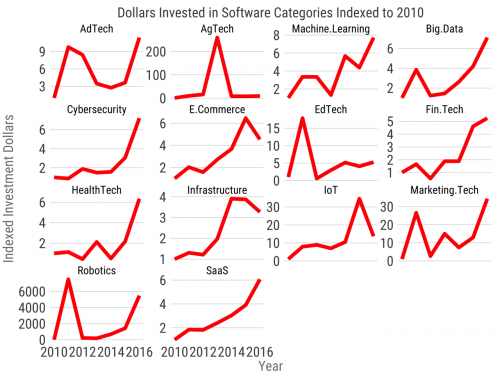Next-generation 3D Graphics on the Web
Thanks to Benedict Evans for noticing this. From his newsletter:
Apple proposed web standards that give web pages access to the smartphone (or PC) GPU to run ‘general purpose computation’ (i.e. machine learning) as well as graphics. Very surprising – I’d have expected this from Google or Facebook rather than ‘everything should be an app’ Apple…
This is good news for the open web, and I don’t find it surprising at all. The open web is under attack from many directions, but it is not going away even in an all mobile world. The question is its relative share with proprietary channels, and neither Apple, Google, or Facebook knows just how that will evolve. The article is a bit technical. Read More
Marketers note… Gen Z Rising Fast
Millennial entrepreneur Brit Morin…
… lately, I’m beginning to feel like I’m no longer part of the popular crowd at school. The focus has shifted to a new group of kids in town: Generation Z. … Last year, I sat in on an internal strategy discussion at a Fortune 500 beauty brand where the CEO spent 30 minutes discussing this new generation; the term “millennial” seemed to be used in the past tense. … Gen Zers are more diverse than past generations in both psychographics and demographics, and can’t be reached by traditional business tactics.
And to think how far behind so many companies are even providing a good mobile experience! Read More
Google makes it easier to see and share publishers’ real URLs from AMP pages
This is an example of the ongoing tug of war between platforms and publishers for control over content. This is not a war someone wins, but a long sometimes painful rebalancing. This concession addresses a big concern about AMP, but will it be enough to attract a critical mass of publishers? Read More
Cognitive Overhead is Your Product’s Overlord
No one intends to build a product with large cognitive overhead, but it happens if there isn’t forethought and recognition for it. “We saw the value being added with Flock’s predictive abilities — and a small group of users really loved them — but it was a cognitive maze for the rest of the world,” says Lieb. “The moment you assume people understand the value you’re adding — especially when it’s a new concept — you dive into cognitive overhead territory.”
David Lieb has some interesting, perhaps counter-intuitive, ideas for navigating this problem. Read More
Software Startup Markets Raising the Most Capital in 2017
Hopefully some validation rather than a surprise for investors, startups, and of course analysts. Read More

Also…
The best kind of case study… A Year of Running a SaaS “Side Business” via Priceonomics
So many big data opportunities… The Greatest Public Datasets for AI via Startupgrind
One example, but what is the future of app stores? Making More Outside The App Store via the Rogue Amoeba Blog
A little geeky but fun… Amazon is eating the software (which is eating the world via Hackernoon
A slightly subversive way to research Technical Leadership Indicators via Winton Technology Blog
The Gilbane Advisor curates content for our community of content, computing, and digital experience professionals. Subscribe to our newsletter, or our feed.

